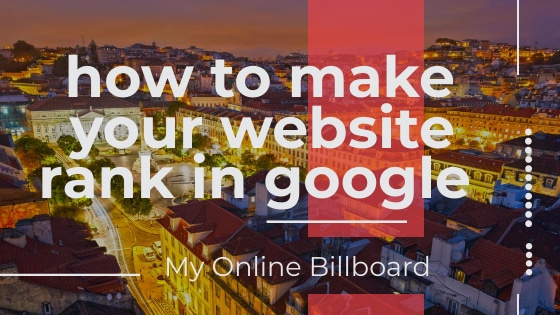how to make your website rank in google
Every business and website owner dreams of ranking the best on Google. the explanations are clear: reaching that top spot (or even one amongst the highest three spots) would mean increased traffic to your site, visibility, and therefore the potential for sales to catapult your business before the competition.
Unfortunately, high rankings rarely happen out of the blue. Even the foremost skilled and knowledgeable marketers struggle with getting the top-ranking spot. So, how can an everyday business owner hope to attain this feat? While there is no direction to absolutely guarantee high rankings, this post will explore some strategies anyone can use to significantly increase their chances of claiming that #1 spot.

1. Go niche.
Part of succeeding at SEO is knowing the competitive landscape. As a little business owner, you do not want to be competing with large organizations that have seemingly unlimited marketing budgets. While there’s always an opportunity you’ll be able to outrank them, more likely you’ll just find yourself wasting some time and money.
This is why it is so important to chase a niche. Here’s what I mean by this: rather than trying to compete with big companies for very popular (and usually more general) keywords, drill-down and become a “big fish in an exceedingly small pond.”
Keep in mind, this can often mean shifting the main target of your business from more general to more specific products or services. as an example, rather than exclusively offering general home renovation services, you’ll consider specializing in “one-day bathroom Renos” or “custom kitchen makeovers.” These more specific keyword phrases will likely be much easier to rank for, which can mean you’ll start ranking that much faster.
2. Choose realistic keywords.
Anyone can get the highest spot in Google if they choose the proper keywords. for example, if I optimized a page for a “Big Blue Flying Squirrel With An Amazing Six Pack of Beer Cans” I could probably grab the highest stop in a very few days. However (and it is a big however), would I actually want to rank for this phrase? Probably not, considering it isn’t even a true product.
My point is this: If you select keywords that are obscure enough, it is easy to rank. Of course, we do not want to rank for obscure keywords; we would like to rank for keywords that individuals are literally searching for. Real queries that somebody typed in their browser.
Using tools like Google’s Keyword Planner or KeywordTool.io, hunt for relevant keywords that have a good number of searches, but little competition. Once your website features a bit more authority and you’re ranking for a variety of easier keywords, you’ll always advance to more competitive keywords which will earn you more traffic.
3. Optimize every bit of content for your keywords.
Once you’ve “gone niche” and have chosen some easier keywords, it is time to use those keywords in strategic places on your page. While you certainly don’t need to overuse your keywords, it’s important to use them in a form of ways within your content. most significantly, concentrate on using them in your:
- URL
- Title tag.
- Headings: H1, H2, etc.
- Image Alt descriptions, tag, and image captions
- Throughout your content.
Keep in mind that Google (and your readers) favor comprehensive content that does an excellent job of covering the subject at hand. So, while it is vital to use your keywords somewhere in your content, that’s no substitute for writing longer, more in-depth content that actually does justice to the subject.
4. Add plenty of content to your site.
According to the Content Marketing Institute, 88% of B2B companies now use content marketing as a part of their overall marketing strategy. This involves deploying a wide selection of content-type – blog posts, newsletters, webinars, infographics, videos, etc. – to draw in potential customers.
If you would like to obtain top rankings in Google, you absolutely must be adding new content to your site regularly. But don’t just add content for content’s sake; add useful, high-quality content that really provides value to your customers and prospects.
This content will assist you to boost your rankings in two primary ways. Number one, the more information you have on your website and blog, means more keywords, and thus more opportunities for Google to return your site to people searching within the search results on Google. Second, the more content you’ve got, the more links you generally accumulate. Plus, having various content is great for getting visitors to remain on your site longer. Win-win!
5. Acquire links to your site.
Links still play a critical role in terms of SEO. Some strategies you’ll use to accumulate links to your site include:
- Adding your Blog or Website to national and local online directories and review sites such as Google, Bing, Yahoo, Quora, and much more.
- Guest posting on popular sites in your niche.
- Creating high-quality content that other people want to be connected to.
- Getting free and paid for PR from news stations
6. Online billboards
It’s common to come across ads on premium websites, applications and games. These ads are known as online billboards. For more information about online billboards follow https://myonlinebillboard.com.
Ready to get started To Rank Your Website?
There is no surefire guarantee to get a #1 ranking on Google. However, targeting the proper keywords and audience can significantly increase your chances. Follow that up by creating and promoting plenty of well-optimized content, and you’re good to go! Those top rankings could happen much before you think that.
